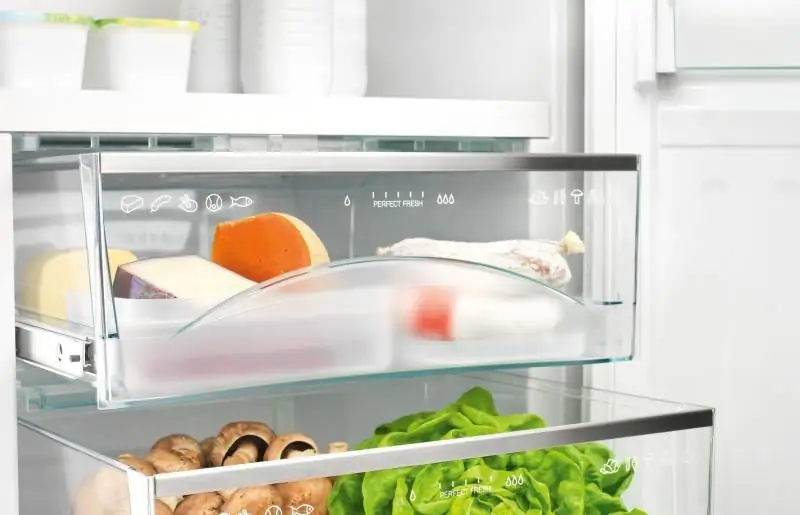
Table of contents:
- Author Bailey Albertson albertson@usefultipsdiy.com.
- Public 2023-12-17 12:53.
- Last modified 2025-06-01 07:32.
How to defrost your fridge freezer properly

For years, refrigerators have been an integral part of every kitchen. New ultra-modern household appliances do not require careful maintenance and do not cause much trouble for housewives. But it doesn't hurt to find out how to properly defrost and whether it should be done.
Content
-
1 Why defrost your refrigerator and freezer
-
1.1 How often to defrost
- 1.1.1 Frequency of defrosting of refrigerators from different manufacturers
- 1.1.2 How the frequency of defrosting is influenced by the operating characteristics of the device
-
-
2 How to properly defrost
- 2.1 General defrosting and washing the refrigerator - video
- 2.2 Common mistakes
- 3 How to turn on the appliance correctly after defrosting
Why defrost your refrigerator and freezer
The principle of operation of any refrigeration equipment is a closed cycle in which a motor-compressor drives a special refrigerant substance through the pipes. Usually the system is filled with freon. Passing through zones of high and low pressure, passing from liquid to gaseous state and vice versa, the refrigerant provides a decrease in temperature in the refrigerator and freezer.

The principle of operation of the refrigerator is a closed cycle in which the compressor drives the refrigerant through the pipes (designations in the diagram: 1-condenser, 2 - capillary, 3 - evaporator, 4 - compressor)
This is how it works:
- Freon vapors injected into the condenser are cooled and condensed. The substance turns into a liquid state. The heat received from freon is released by the condenser into the environment. That is why the back wall is always hot when the refrigerator is in operation.
- After the condenser, liquid freon enters the capillary tube under high pressure. As it moves through the tube, its pressure gradually decreases to the desired level.
- After the capillary, low pressure liquid freon enters the evaporator channels, where, taking heat, it instantly boils and turns into steam. Due to this, the internal volume of the chamber is cooled. Frost forms on the surface of the evaporator.
- Having passed through the evaporator, the freon vapor is pumped out by the compressor into the condenser.
The cycle is repeated until the set temperature is established on the surface of the evaporator. The compressor is then switched off.
The warm ambient air causes the temperature inside the refrigerator to gradually rise. When it reaches a certain value, the compressor turns on again, repeating the described cycle. Moisture in the air freezes. A snow-ice build-up appears on the surface of the evaporator, which disrupts the necessary air exchange and complicates the operation of the device. With a large layer of ice, the compressor will operate at full capacity. This will increase electricity consumption. The number of work cycles will increase. The compressor will turn off less and less and then stop altogether. As a result, the function of proper storage of products in the household appliance will be disrupted, and its service life will be sharply reduced. Also, the compressor may fail and need to be replaced. That is why it is necessary to defrost the refrigerator as soon as the amount of ice on the evaporator reaches a significant size. Ice build-up takes up space inside the freezer, leaving less space for food, and the food itself freezes much more slowly. If you do not defrost, the ice will grow to such a size that the door will not close. And that will only make the problem worse.

A large layer of ice will impair performance and can damage the refrigerator.
How often to defrost
The frequency of defrosting directly depends on the amount of frozen ice in the freezer: the more and faster it builds up, the more often you need to defrost the refrigerator. Much depends on the model of the refrigerator itself, the intensity and nature of its operation.
Frequency of defrosting refrigerators from different manufacturers
The instructions usually indicate after what period of time the defrost is necessary:
- Modern refrigerators with a drip or air-drip system, for example, Atlant, Indesit, must be defrosted at least once a year.
- Old Soviet units - Minsk, Saratov - require more frequent defrosting: once every 4 weeks. If the refrigerator is not used very actively, you can increase the period, but at least once every two months in summer and four months in winter.
- In refrigerators equipped with the No frost system, the defrosting process takes place automatically. Water flows to the back of the appliance through a special drain hole, and then evaporates from the heat generated by the compressor. You do not need to specially defrost such devices. But sometimes you still have to wash and disinfect.
How the frequency of defrosting is affected by the operating characteristics of the device
How often the refrigerator is used, how this is done correctly, directly depends on how often it will have to be defrosted:
-
Frequent opening and closing of the door leads to the fact that a large amount of warm air enters the chamber, which crystallizes into a snow build-up at negative temperatures. The same result will be obtained if the door is opened for too long. Try to first think about what exactly you want to take, and then open the device and do it quickly. Don't wait for a beep.

Girl at the open refrigerator It is difficult for the refrigerator to operate if the door is opened frequently and for a long time
- The increase in the snow layer is facilitated by the evaporation of moisture from food. Store food in sealed containers.
-
The penetration of warm air inside the refrigerator can be caused by a loose fit of the rubber seal, if it has lost its quality. As a result, the ice build-up will appear very quickly. The situation can be corrected by replacing the part.

Refrigerator rubber seal Due to the poorly adhering rubber seal, warm air penetrates into the chamber, which impairs the operation of the equipment
How to defrost properly
For most models, it is recommended to operate the device at an ambient temperature of 10-30 o C. Experts recommend using the same temperature range when defrosting refrigeration devices. Therefore, in hot climates, it is advisable to start defrosting in the evening, when the air has cooled slightly. The ice will melt overnight, and in the morning you can finish the process. So, the stages of defrosting:
-
Turn off the device:
- in a refrigerator with one compressor, simply unplug the plug;
- chambers of two-compressor equipment can be defrosting separately by setting the lever on the control panel of the defrosting chamber to zero;
-
if both chambers are defrosting at the same time, it is better to de-energize the device by removing the plug from the socket: this action will protect against accidental electrical injury.

Refrigerator Liebherr In a two-compressor appliance, the refrigerator and freezer can be defrosted separately, which is very convenient for maintaining the quality of food
-
Remove food from the refrigerator. Here are some ideas on how to preserve their quality during defrosting:
- it is best to place them in another refrigerator, for example, with such a request, you can turn to your neighbors or "occupy" the refrigerator at work for a while, if it is convenient to do so;
- in winter, food can be placed on a balcony or outside window sill, securing them: put food in a bag, put it outside the window, and press the bag handles tightly with the frame;
- in a private house, you can use a cellar: it is cool even in summer;
- you can put food from the refrigerator and freezer into one large basin, overlay it with pre-prepared ice and cover with a thick blanket or bedspread, and then put it in the coolest part of the room, away from the sun's rays;
- perishable dishes, for example, a pot of borscht, can be immersed in a bath of water: first drain the warm water from the tap, when it becomes cool, close the bath and place the pot on the bottom;
-
use cold accumulators - special containers made of materials with high heat capacity and capable of maintaining the desired temperature for a long period of time.

Cold accumulators Cold accumulators allow you to keep food at the desired temperature for a long period of time
- Remove all removable parts and accessories from the refrigerator: trays, racks, shelves, containers, etc. While the appliance is defrosting, wash and dry them.
-
Wait for the refrigerator to defrost. This can take 3-10 hours, depending on the ice layer:
- modern models have a special drip tray for collecting melt water;
- in a Soviet refrigerator, place a bowl under the freezer, and put dry rags or rags around the device, because there will be a lot of melt water and it will spread in all directions.
-
Manufacturers do not recommend speeding up defrosting, but if you really want to, then choose safe methods:
-
install the fan opposite the refrigerator so that the air enters the chamber: the ice will melt faster;

Fan The fan can speed up the defrosting of the refrigerator
-
ordinary table salt copes well with ice: pour it on a saucer and put it inside the freezer or scatter it over the surface of the ice build-up;

Salt Regular table salt will help clear ice from the refrigerator faster
-
the vinegar solution will not only speed up the defrosting, but also disinfect the inner space of the chamber: dilute the vinegar with water in a 1: 1 ratio and use a spray bottle to apply the product on the snow ice.

Vinegar The vinegar solution will speed up defrosting and disinfect surfaces inside the refrigerator compartment
-
-
When all the ice has melted, wash the refrigerator. To do this, use soft cloths or sponges, liquid dishwashing detergents. Do not use abrasive products such as hard brushes, scouring powders. They will damage the inside of the camera, leaving scratches on it. Wash the rubber seal with soapy water and do not forget to remove dust from the condenser located on the back of the unit. The most convenient way to do this is with a vacuum cleaner, but a small brush will also work. To clean the inside of the instrument, use:
-
soda solution: dilute 2 tbsp. l. means in 0.5 l of warm water, stir well, apply with a sponge to the surface of the chambers and leave for half an hour, and then rinse with clean water;

Baking soda Refrigeration equipment manufacturers recommend treating appliances with a baking soda solution
-
ammonia (in case of heavy dirt, to eliminate unpleasant odor and disinfect): for one part of alcohol, take 7-10 parts of water, moisten a napkin in a solution and put it on a dried spot, after half an hour rinse the camera with plenty of water;

Ammonia With the help of ammonia, you can wash off strong dirt from the inner surfaces of the refrigerator and disinfect them.
-
lemon to eliminate mold and unpleasant odors: add 2-3 tbsp. l. lemon juice, wipe the walls of the chamber and shelves with the resulting product;

Lemon Lemon does a good job at removing mold and odor
-
special products for hygienic cleaning of the refrigerator, e.g. HG spray.

Refrigerator cleaner HG Special products for the refrigerator clean surfaces well and are easy to use
-
-
Wipe the clean refrigerator dry with a soft cloth. After all, any moisture remaining inside the chamber will contribute to a new ice build-up.

Wipe the refrigerator with a napkin Using a soft cloth, wipe the refrigerator dry after cleaning
- After all the procedures, do not rush to immediately turn on the refrigerator, leave it with the door open for half an hour. This time is enough for an accidentally left drop of water to dry naturally.

The built-in refrigerator defrosts in the same way as the freestanding
General defrosting and washing of the refrigerator - video
Typical mistakes
- Not often, but there are times when they forget to turn off the refrigerator and begin to defrost it. That is, they open the door, take out the food, sometimes they even go somewhere … And the device continues to increase the temperature at this time.
- A mistake that would be very costly. It is strictly forbidden to try to break off the ice with the help of any mechanical devices. The evaporator tubes are not strong enough, they can easily be pierced with a knife, fork or something else.
- The same applies to food or utensils frozen to the wire rack or evaporator plate. Any attempt to pull them out may damage the unit. The best advice is to wait.
- A flaw that is passed off as dignity. There is a lot of information on the net about how you can quickly and easily defrost a refrigerator in 10 minutes. All methods are reduced to a forced increase in the temperature inside the chamber. For example, they recommend placing a bowl of hot water in the freezer or blowing hot air on the ice crust with a hairdryer. Nobody argues that the ice will melt very quickly from hot water and air. Although the device will not break down immediately from such an action, its service life will be reduced. Any rise in temperature can damage the cooling and freezing system.

For high-quality and long-term operation of refrigeration equipment, manufacturers recommend installing an air conditioner in the room.
How to turn on the appliance correctly after defrosting
It's pretty simple:
- Connect the refrigerator to the mains, that is, insert the plug into the socket. Close the doors and do not load the food yet.
- Set the fridge and freezer to an average on the control panel. Press the Super Freeze button. Illuminated indicators will confirm the correctness of the action. The refrigerator builds up the temperature in the chambers without food.
- When the optimum temperature is reached, the indicators will turn off. This event signals that food can be loaded into the refrigerator chambers.
- For old refrigerators that do not have a control panel, plug them in and leave for 1-2 hours without loading food. During this time, the device will be able to collect enough cold. After that, you can place products in it.
Over time, any refrigerator will have to be defrosted. Even models with No frost function sometimes need this. Compliance with simple rules will not only allow you to update the cycle, but also ensure high-quality operation of the device for many years.
Recommended:
How To Get Rid Of The Smell In The Refrigerator: Effective Ways To Remove The Smell Of Fish, Mold, Including Quick + Photos And Videos

How to get rid of an unpleasant smell inside the refrigerator. Effective ways and means of combating stubborn odors. Tips from experienced housewives
How To Quickly Defrost Minced Meat And Do It Right At Home, Including Without A Microwave + Photos And Videos

Does every housewife know how to defrost minced meat not only quickly, but also correctly, while preserving all its taste properties and useful qualities? Tips - in the article
How To Quickly Defrost Fish And Do It Right At Home, Including Without A Microwave + Photos And Videos

How to properly defrost fish. Defrosting method selection, quick defrosting options
How To Quickly Defrost A Chicken And Do It Right At Home, Including Without A Microwave + Photos And Videos

How to defrost chicken quickly and correctly. Proven methods with step by step instructions. Photos and videos on the topic
3 Ways To Properly Freeze A Pumpkin In The Freezer, Including For Feeding A Baby: Puree, Pieces Or Grated

How to freeze pumpkin in the freezer in various ways. Step by step instructions, the benefits of different options
